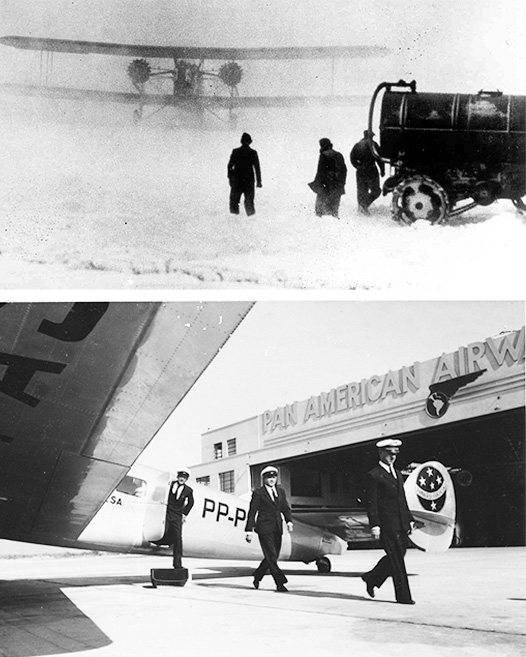FEBRUARY 1934
“One of a Kind:
Pan Am Dodges the Domestic Air Mail Scandal of 1934”

Photos: A study in environmental contrasts. Wintertime air mail operations by US Army Air Corps vs. Pan American’s international partnership in Brazil. Top: US Army Air Corps Keystone B-6 fueling during snowstorm, 1934 (Wikimedia). Bottom: Panair do Brasil crew exits Lockheed Lodestar, Rio c. 1934 (PAHF collection).
On February 9, 1934, President Roosevelt canceled US domestic air mail contracts. Within ten days, the US Army Air Corps would be carrying air mail in the US. That decision proved a deadly blunder, while Pan Am would continue to fly US foreign air mail.
The affair started months earlier when reporter Fulton Lewis learned that the Post Office Department had granted a contract to carry air mail for 69 cents/pound, while rejecting a far lower bid! Lewis thought something smelled rotten. He did some sleuthing and turned his information over to US Senator Hugo Black of Alabama.
Senate hearings followed, resulting in a ballooning scandal. It turned out that in 1930, the previous Hoover Administration's Postmaster General Walter Brown secretly colluded with a select group of airlines to favor them with air mail contracts, while freezing out other airlines. His intent was to make the system more efficient, but it plainly contravened the then-new Air Mail Act of 1930. The process was dubbed the "spoils conferences." These revelations soon found their way into President Roosevelt’s cabinet meeting. At the bad advice of Secretary of War George Dern, FDR ordered all current domestic air mail contracts canceled, and tasked the Army to fly domestic air mail.
Pan American Airways had also been favored by the prior Republican Administrations, but under a different law, the Foreign Air Mail Act of 1928. Under the act, Pan Am did not have to be the lowest bidder, just the one judged “best” by the Post Office. In truth, it was not a competitive bidding process. The arrangement was noticed by Senator Black and his committee.
But Pan Am mostly escaped FDR's wrath. There was no replacing America's sole international air carrier, no matter how great the political urge. Even after the intense public scrutiny of air mail contracts, Pan Am got off with a token and temporary revision of its air mail contract subsidy.
Air Corps fliers flew air mail in the US, and their orders proved fatal for thirteen of the ill-equipped and unprepared pilots. But it was impossible to have the US Army carry out the same all-important mission across foreign borders. Pan Am was the only US airline that operated outside the the US. Not only that, Pan Am's personnel, both in the air and on the ground successfully operated and maintained routes across far-flung mountains, jungles, deserts, and significant open water. All this required specialized knowledge, significant infrastructure, and operational experience, not to mention the willing cooperation of foreign governments. The US national interest trumped any political considerations.
Pan Am may have had a "special relationship" with Washington during the Republican years of the '20s and '30s, but even after that it was clear that the airline's importance to the US went far beyond politics, at least in 1934. Pan Am was truly one of a kind!

